Sinus rhythm one p - Study guides, Class notes & Summaries
Looking for the best study guides, study notes and summaries about Sinus rhythm one p? On this page you'll find 1866 study documents about Sinus rhythm one p.
Page 4 out of 1.866 results
Sort by
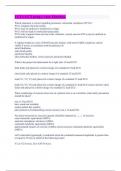
-
CCI's CCT prep || very Flawless.
- Exam (elaborations) • 19 pages • 2024
- Available in package deal
-
- $12.99
- + learn more
Which statement is correct regarding premature ventricular complexes (PVCs)? PVCs originate from the atrium. PVCs may be unifocal or multifocal in origin. PVCs will not lead to ventricular tachycardia. PVCs only originate from one site in the ventricles. correct answers PVCs may be unifocal or multifocal in origin. A regular rhythm at a rate of 40-60 beats per minute, with narrow QRS complexes, and no visible P waves, is consistent with the presence of: atrial fibrillation. sinus bradyc...
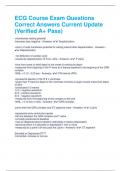
-
ECG Course Exam Questions Correct Answers Current Update (Verified A+ Pass)
- Exam (elaborations) • 22 pages • 2024
-
- $14.99
- + learn more
ECG Course Exam Questions Correct Answers Current Update (Verified A+ Pass) -membranes resting potental -becomes less negative - Answers - Depolarization -return of cells membrane potential to resting potentil after depolarization - Answers - Repolarization -1st deflection of cardiac cycle -caused by depolarization of R & L atria - Answers - P wave -time from onset of atrial depol to the onset of ventricular depol -measured from begining of the P wave as it leaves baseline to the...
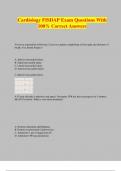
-
Cardiology FISDAP Exam Questions With 100% Correct Answers
- Exam (elaborations) • 23 pages • 2024
-
- $13.49
- + learn more
Cardiology FISDAP Exam Questions With 100% Correct Answers You have acquired the following 12 lead on a patient complaining of chest pain and shortness of breath. You should Suspect? A. Inferior myocardial injury. B. Septal myocardial injury. C. Lateral myocardial injury. D. Anterior myocardial injury C. Inferior myocardial injury A 55 year old male is pulseless and apneic. Bystander CPR has been in progress for 5 minutes. His ECG is below. What is your initial treatment? A. Perform i...
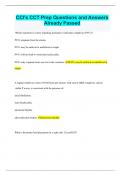
-
CCI's CCT Prep Questions and Answers Already Passed
- Exam (elaborations) • 47 pages • 2024
- Available in package deal
-
- $11.99
- + learn more
CCI's CCT Prep Questions and Answers Already Passed Which statement is correct regarding premature ventricular complexes (PVCs)? PVCs originate from the atrium. PVCs may be unifocal or multifocal in origin. PVCs will not lead to ventricular tachycardia. PVCs only originate from one site in the ventricles. PVCs may be unifocal or multifocal in origin. A regular rhythm at a rate of 40-60 beats per minute, with narrow QRS complexes, and no visible P waves, is consistent with the pre...
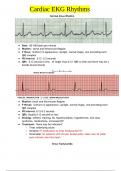
-
Cardiac EKG Rhythms (Updated) Normal Sinus Rhythm
- Exam (elaborations) • 11 pages • 2023
-
- $10.49
- + learn more
Cardiac EKG Rhythms (Updated). Normal Sinus Rhythm Normal Sinus Rhythm ● Rate: 60-100 beats per minute ● Rhythm: Atrial and Ventricular Regular ● P Wave: Uniform in appearance, upright, normal shape, one preceding each QRS complex ● PR Interval: 0.12- 0.2 seconds ● QRS: 0.12 second or less. (If larger than 0.12- QRS is wide and there may be a bundle branch block) Sinus Bradycardia ● Rate: Less than 60 beats per minute ● Rhythm: Atrial and Ventricular Regular ● P Waves...
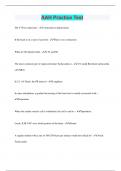
-
AAH Practice Test
- Exam (elaborations) • 16 pages • 2024
- Available in package deal
-
- $9.99
- + learn more
AAH Practice Test The T Wave represents - ventricular re-polarization If the heart is in a state of asystole - There is no contraction What are the bipolar leads - I, II, and III The most common type of supraventricular Tachycardia is - AV nodal Reentrant tachycardia (AVNRT) In 2:1 AV block, the PR interval - Lengthens In sinus arrhythmia, a gradual decreasing of the heart rate is usually associated with: - Expiration When the cardiac muscle cell is stimulated, the cell is...
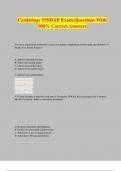
-
Cardiology FISDAP Exam Questions With 100% Correct Answers
- Exam (elaborations) • 23 pages • 2024
-
- $13.49
- + learn more
Cardiology FISDAP Exam Questions With 100% Correct Answers You have acquired the following 12 lead on a patient complaining of chest pain and shortness of breath. You should Suspect? A. Inferior myocardial injury. B. Septal myocardial injury. C. Lateral myocardial injury. D. Anterior myocardial injury C. Inferior myocardial injury A 55 year old male is pulseless and apneic. Bystander CPR has been in progress for 5 minutes. His ECG is below. What is your initial treatment? A. Perform i...
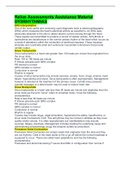
-
Relias Assessments Assistance Material DYSRHYTHMIAS (Answered) 2022/2023
- Exam (elaborations) • 5 pages • 2022
- Available in package deal
-
- $9.49
- 2x sold
- + learn more
Relias Assessments Assistance Material DYSRHYTHMIAS EKG interpretation One of the most useful and commonly used diagnostic tools is electrocardiography (EKG) which measures the heart's electrical activity as waveforms. An EKG uses electrodes attached to the skin to detect electric current moving through the heart. These signals are transmitted to produce a record of cardiac activity. Arrhythmia or dysrhythmia are disturbances in the normal cardiac rhythm of the heart which occurs as a result ...
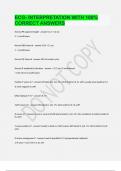
-
ECG- INTERPRETATION WITH 100% CORRECT ANSWERS.
- Exam (elaborations) • 19 pages • 2023
- Available in package deal
-
- $13.99
- + learn more
Normal PR segment length 0.12 - 0.2 sec 3 - 5 small boxes Normal QRS interval 0.06 - 0.1 sec 1 - 3 small boxes Brainpower Read More Previous Play Next Rewind 10 seconds Move forward 10 seconds Unmute 0:02 / 0:15 Full screen Normal QT interval 40% of cardiac cycle Normal P amplitude & duration < 0.12 sec (3 small boxes) < 0.25 mV (2.5 small boxes) Positive P waves in? left lateral (I, aVL, V5, V6) & inferior (II, III, aVF); usually most posi...
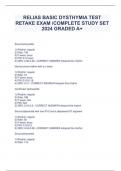
-
RELIAS BASIC DYSTHYMIA TEST RETAKE EXAM /COMPLETE STUDY SET 2024 GRADED A+
- Exam (elaborations) • 68 pages • 2023
- Available in package deal
-
- $18.49
- + learn more
Sinus tachycardia 1) Rhythm: regular 2) Rate: 136 3) P wave: sinus 4) PRI: 0.12 secs 5) QRS: 0.06-0.08 - CORRECT ANSWER-Interpret this rhythm Normal sinus rhythm with a u wave 1) Rhythm: regular 2) Rate: 72 3) P wave: sinus 4) PRI: 0.16-0.18 5) QRS: 0.12 - CORRECT ANSWER-Interpret this rhythm Ventricular tachycardia 1) Rhythm: regular 2) Rate: 188 3) P wave: N/A 4) PRI: N/A 5) QRS: 0.16-0.2 - CORRECT ANSWER-Interpret this rhythm Sinus bradycardia with one PVC and a depressed S...

$6.50 for your textbook summary multiplied by 100 fellow students... Do the math: that's a lot of money! Don't be a thief of your own wallet and start uploading yours now. Discover all about earning on Stuvia


